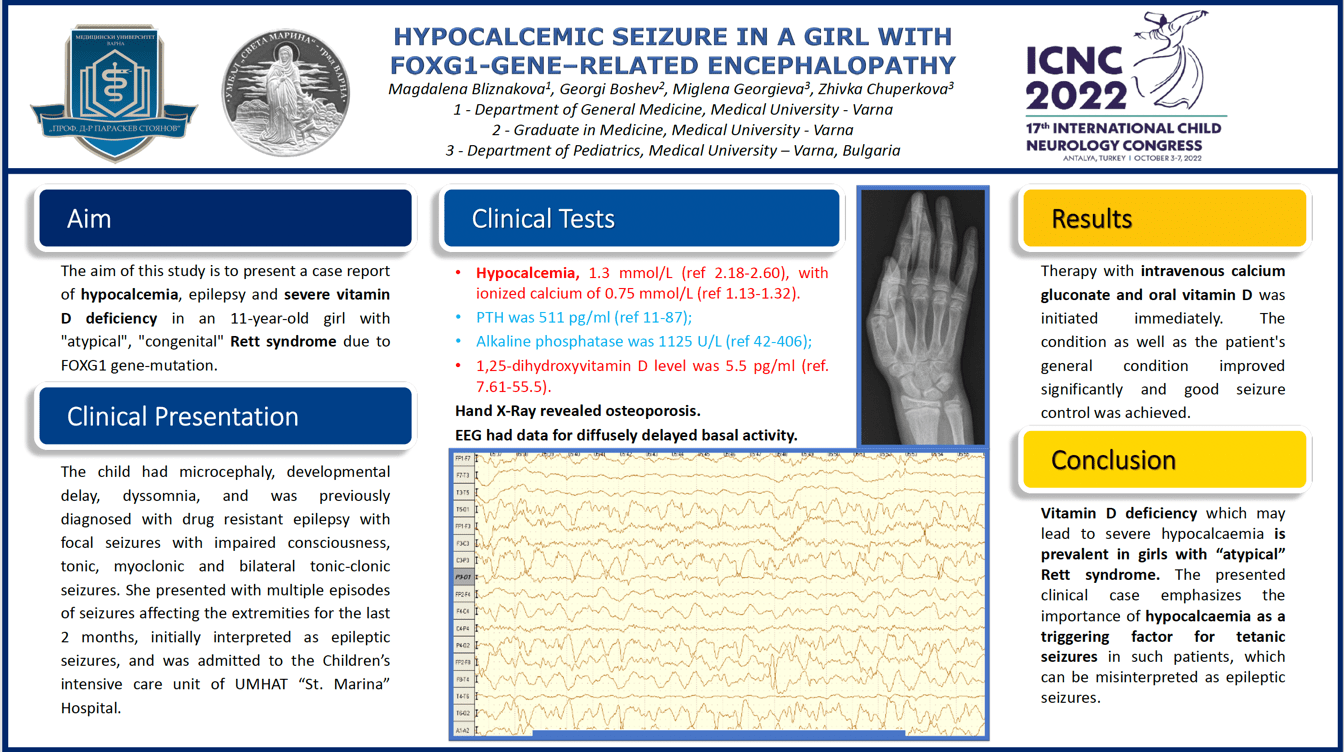Hypocalcemic Seizure in a Girl with FOXG1-Gene–Related Encephalopathy
Magdalena Bliznakova, Georgi Boshev, Zhivka Chuperkova, Miglena Georgieva
Objectives: The aim of this study is to present a case of hypocalcemia in a girl with FOXG1 gene-related encephalopathy, epilepsy, and severe vitamin D deficiency, and to differentiate the hypocalcemic tetanic seizures from the tonic seizures, both experienced by the patient. Methods: Case report. Results: We report an 11-year-old girl with “atypical” Rett syndrome due to a FOXG1 gene mutation with microcephaly, developmental delay, dyssomnia, and previously diagnosed drug resistant epilepsy with complex partial, tonic, myoclonic and generalized tonic-clonic seizures. She presented with multiple episodes of jerks affecting the extremities for the last 2 months, initially interpreted as epileptic seizures, and was admitted to the intensive care unit. Laboratory studies showed hypocalcemia, 1.3 mmol/L (ref 2.18-2.60), with ionized calcium of 0.75 mmol/L (ref 1.13-1.32). PTH was 511 pg/ml (ref 11-87), alkaline phosphatase was 1125 U/L (ref 42-406), and 1,25-dihydroxyvitamin D level was low at 5.5 pg/ml (ref. 7.61-55.5). Hand X-Ray revealed osteoporosis. EEG showed diffuse slowing. Therapy with intravenous calcium gluconate and oral vitamin D was initiated immediately. The condition improved and good seizure control was achieved. Conclusion: Vitamin D deficiency which may lead to severe hypocalcaemia is prevalent in girls with “atypical” Rett syndrome. Our clinical case highlights the importance of hypocalcemia as a triggering factor for tetanic spasms in such patients, which can be misinterpreted as epileptic seizures.
Keywords: hypocalcemia, Rett syndrome, seizures
Magdalena Bliznakova
Medical University Varna
Bulgaria
Georgi Boshev
Medical University Varna
Bulgaria
Zhivka Chuperkova
Medical University Varna
Bulgaria
Miglena Georgieva
Medical University Varna
Bulgaria
Objectives: The aim of this study is to present a case of hypocalcemia in a girl with FOXG1 gene-related encephalopathy, epilepsy, and severe vitamin D deficiency, and to differentiate the hypocalcemic tetanic seizures from the tonic seizures, both experienced by the patient. Methods: Case report. Results: We report an 11-year-old girl with “atypical” Rett syndrome due to a FOXG1 gene mutation with microcephaly, developmental delay, dyssomnia, and previously diagnosed drug resistant epilepsy with complex partial, tonic, myoclonic and generalized tonic-clonic seizures. She presented with multiple episodes of jerks affecting the extremities for the last 2 months, initially interpreted as epileptic seizures, and was admitted to the intensive care unit. Laboratory studies showed hypocalcemia, 1.3 mmol/L (ref 2.18-2.60), with ionized calcium of 0.75 mmol/L (ref 1.13-1.32). PTH was 511 pg/ml (ref 11-87), alkaline phosphatase was 1125 U/L (ref 42-406), and 1,25-dihydroxyvitamin D level was low at 5.5 pg/ml (ref. 7.61-55.5). Hand X-Ray revealed osteoporosis. EEG showed diffuse slowing. Therapy with intravenous calcium gluconate and oral vitamin D was initiated immediately. The condition improved and good seizure control was achieved. Conclusion: Vitamin D deficiency which may lead to severe hypocalcaemia is prevalent in girls with “atypical” Rett syndrome. Our clinical case highlights the importance of hypocalcemia as a triggering factor for tetanic spasms in such patients, which can be misinterpreted as epileptic seizures.
Keywords: hypocalcemia, Rett syndrome, seizures
Magdalena Bliznakova
Medical University Varna
Bulgaria
Georgi Boshev
Medical University Varna
Bulgaria
Zhivka Chuperkova
Medical University Varna
Bulgaria
Miglena Georgieva
Medical University Varna
Bulgaria

Magdalena Bliznakova
Medical University Varna Bulgaria
Medical University Varna Bulgaria